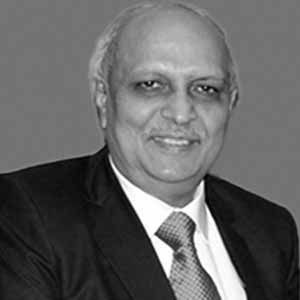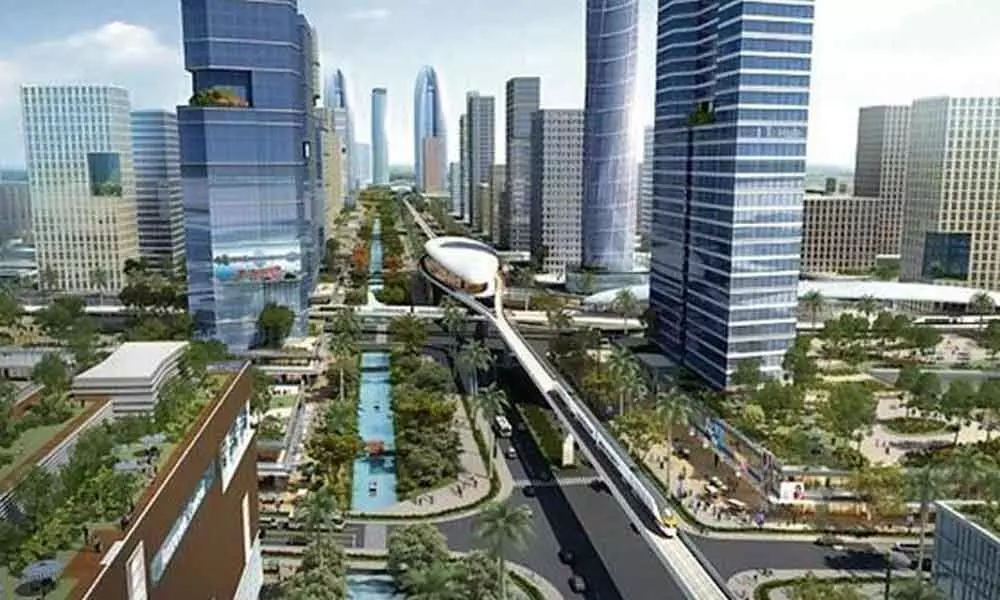Live
- They always want me to win, and now I feel lucky to have been offered a story like ‘Zebra’: Satyadev Kancharana
- ‘Democracy first, humanity first’: PM Modi in Guyana's parliament on two countries' similarities
- PKL Season 11: Telugu Titans register third straight win to top standings
- Is Pollution Contributing to Your COPD?
- NASA Unveils Underwater Robots for Exploring Jupiter's Moons
- Additional Central forces arrive in violence-hit Manipur
- AR Rahman and Saira Banu’s Divorce: Legal Insights into Common Issues in Bollywood Marriages
- 82.7 pc work completed in HPCL Rajasthan Refinery area: official
- Curfew relaxation extended in 5 Manipur districts on Friday
- Tab scam prompts Bengal govt to adopt caution over fund disbursement
Just In
A quiet burial to a project which never took off


Last week Government of Andhra Pradesh and Singapore government decided quietly to bury the startup area project of Amaravati by mutual consent.
Last week Government of Andhra Pradesh and Singapore government decided quietly to bury the startup area project of Amaravati by mutual consent.
Similar notification was given both at Amaravati as well as from Singapore. This was a project which was never conceived properly and termination is a welcome development .
It all started with the search for the new capital for the new state of Andhra Pradesh in 2014. Singapore government sensing the possibilities of lucrative investment opportunities came forward with the proposal to prepare the master plan free of cost but subsequently for the detailed master plan they got paid handsomely.
The building of the new capital city was to have at downtown commercial area which is called the startup area in about 1600 acres of land.
Originally, it was thought as a government to government project but subsequently Singapore government brought to the front two of its government enterprises to take up the project as a consortium in partnership with Amaravati development authority an organisation to be floated by the government of Andhra Pradesh.
Since no government project can be handed over by nomination Swiss challenge route was taken to accommodate the Singapore consortium by perverting the process itself. Swiss challenge becomes relevant only when somebody comes with original idea which is unique and the same is put to test by calling for counter offers .
In this case master plan had been prepared by the Singapore entities, the proposal came at the request of the state government of Andhra Pradesh and hence Swiss challenge principles do not apply to this project.
The details were kept in a sealed cover not even evaluated by the government of Andhra Pradesh but was put to tender asking for counter proposals. This was challenged in the court where the process was stayed .
Government of Andhra Pradesh withdrew the case from the High Court stating that certain amendments to the act are going to made and after making those amendments and ensuring that nobody qualified to come with a counterproposal confirmed the project in favour of the Singapore consortium.
Essentially there is no guarantee of investment or the gross revenue to be generated by this project from the Singapore side .
Whatever is the gross revenue that's going to come they agreed to share 5 per cent of gross revenue in Phase -1 , 7.5 per cent in Phase-2 and 12 per cent in Phase -3. Government of Andhra Pradesh had to make available to them 1600 acres of land free of litigation and also provide external infrastructure leading up to the startup area which may cost around Rs 5000 crore.
Any arbitration in this case will be in London and to facilitate this Infrastructure Act was amended. This was an opaque agreement skewed entirely in favour of the Singapore consortium .
But there were two bottle necks that came in operationalising the project . Government could not handover 1600 acres of contiguous land as proposed in the master plan since some of the farmers refused to join in the land pooling and when land acquisition was proposed, approached court and obtained stay order.
More importantly it was realised at a later date that the proposed startup area falls within the prohibited land as per the environmental laws and rules.
When it was originally envisaged startup area was going to be a green and blue concept building on the available islands within Krishna river. National Green Tribunal in its judgement held that the flood plains fall within the flood banks constructed .
Part of the startup area thus falls within these flood banks . As per the rules of the state environmental authority no construction can be taken up within 400 metres on both sides of the river banks and up to two km only plantation of trees can be done.
But most of the startup area as proposed in the master plan falls within this prohibited area. Any termination of agreement before elections on either of these grounds could have resulted in adverse political fallout.
Hence the show was carried on with some occasional activity of presentations and showcasing of achievements of the Consortium members in other countries. It was very clear whoever were to win the elections, the project could not have gone through the way it was planned .
Hence when it was terminated Singapore Consortium should have felt as much relieved of the project as Government of Andhra Pradesh. Hence by mutual consent it was terminated without any objection from the Singapore Consortium as well.
Reason given by Singapore Consortium for not starting the work is that land was not made available to them. Given the environmental considerations there was no way the land as proposed in the master plan could have been made available to them by Government of Andhra Pradesh.
(Writer is former Chief Secretary, Government of Andhra Pradesh)

© 2024 Hyderabad Media House Limited/The Hans India. All rights reserved. Powered by hocalwire.com






